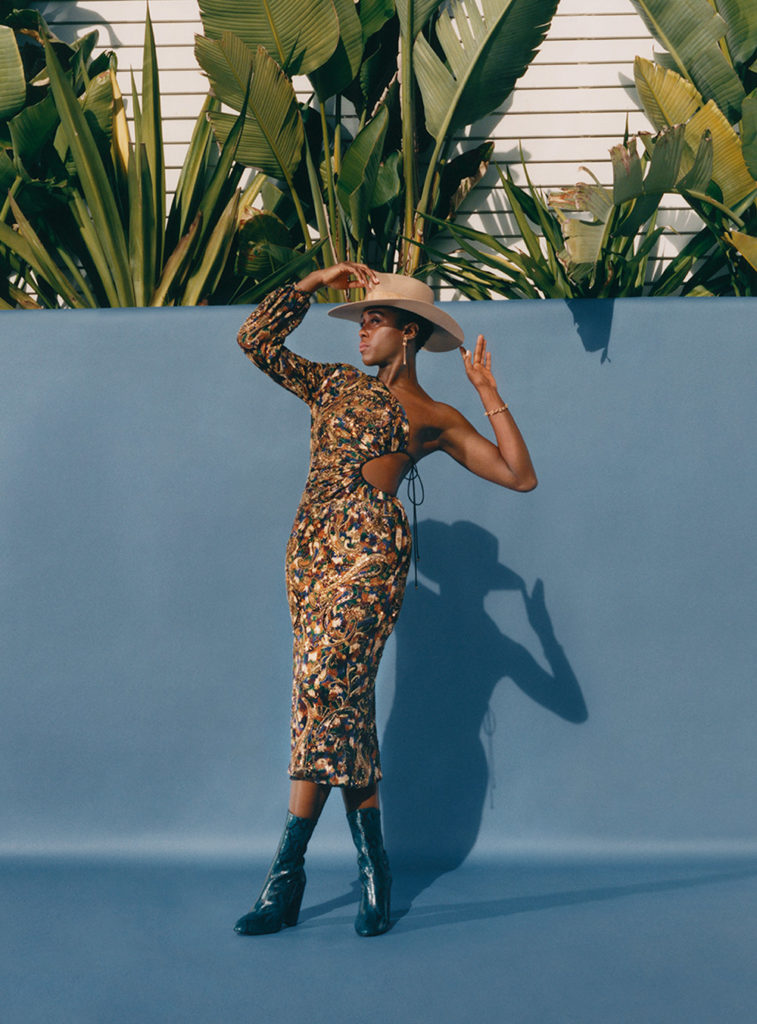
Growing up, Lashana Lynch turned to cartoons for solace in a media landscape in which she rarely saw herself represented. “In my child brain, I was highly frustrated at not seeing something that made sense to me,” the actor says of the lack of black women onscreen during her formative years. Lynch was raised in a traditional Jamaican household in West London and recalls the casting of Jamaican–American powerhouse Grace Jones in the 1985 James Bond film A View to a Kill as a pivotal moment in mainstream media. “I wish I was an adult at that time, to know how it would have felt, as an older Jamaican woman, watching her onscreen and seeing myself. That, I think, would have changed my whole mindset.” Thirty-five years later, Lynch stars in the Bond franchise’s highly anticipated 25th instalment, No Time to Die, with a commitment to empowerment and truth at the core of her role.
Cary Joji Fukunaga’s No Time to Die sees an off-duty James Bond (Daniel Craig) enjoying a change of pace in blissful Jamaica. Bond’s tranquil hideaway is quickly disrupted when he’s called back into service to rescue a kidnapped scientist, veering him onto the hunt for a mysterious villain who possesses formidable technology. Starring alongside Rami Malek, Léa Seydoux, and Christoph Waltz, Lynch plays Nomi—Bond’s replacement after leaving MI6—granting her a 00 secret agent number and big shoes to fill.
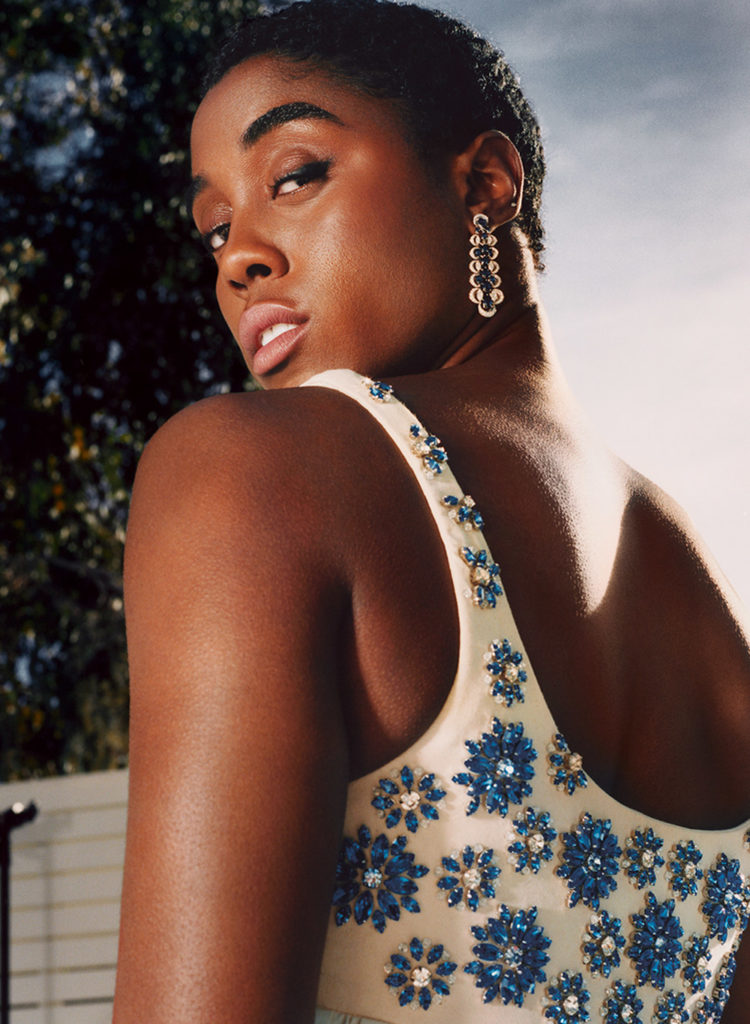
The road to developing Nomi was pensive and exploratory. Lynch worked closely with sharp-witted writer and fellow British talent Phoebe Waller-Bridge to shape the series’s new character after she was brought onto the screenplay writing team—the second-ever female writer to be credited on a Bond film. The pair found common ground easily. “Not only is she lovely, but she is much like me in that she works from a collaborative place, so I felt like I was creating someone really fresh and dynamic with her—as well as funny.”
Along with a wry sense of humour, nuanced nods to Nomi’s social awkwardness and struggles with anxiety were integral to Lynch’s portrayal. “Her personality, for me, wouldn’t necessarily fit into ‘the perfect agent,’ but when you get to know her, then you understand why she’s gotten into the work that she has.” At the heart of Nomi lies Lynch’s commitment to depicting realistic, multi-faceted women that defy stereotypes and tropes. As a secret service agent at the top of her game, Nomi is simultaneously poised and self-conscious, level-headed and anxious, and proves that having to overcome daily challenges doesn’t equal weakness. “I look forward to people learning what pushing through anxiety means and what it looks like.”
Representing femininity and its context in the professional sphere was another essential element in crafting Nomi. Challenging simplified depictions of women in power—including those that choose masculine qualities to signify authority (“like a lady in a big suit”)—Lynch brought a female perspective to the role that took mood, environment, and biology into account. “Hormones can really make a difference to how you approach your work—especially when working in a male-dominated environment—and her mood may not be on point every single day.” She consulted two secret service agents—an American and a Brit who had previously worked on Bond—for insight into navigating the highly demanding world of government espionage as a woman. “I asked them questions like, when do you have lunch? When do you go to the toilet? What happens if you have your period on the job?” Lynch says, to which the real-life agents answered, “You just find time when you find time.”

The unwavering attention required on the job—and its inevitable discomfort—further deepened Lynch’s portrayal of Nomi and her ability to push through.
Joining the cast of a film as long-awaited as No Time to Die—from a series as storied as Bond—presented new and unique obstacles. Lynch was challenged by her aim of respecting the classic, long-running allure of the nearly 60-year-old film franchise while simultaneously allowing the modern perspective of her performance to be felt without compromise. “With any franchise that everyone’s been waiting for for years, you want to know that you’re getting it right—but getting it right doesn’t mean right for the audience; it means right for me. I want to know that the person I am creating in my head is actually coming out every day that I’m on set, and that my ideas actually appear on camera.”
The notion of getting it right for herself gained greater meaning after a barrage of negative comments following the announcement that Lynch would be playing a 00 agent in the upcoming film. The naysayers were self-described diehard Bond fans who objected to the casting, largely spurred on by the misinformation that she would be replacing Bond rather than working in tandem with him. The newly appointed MI6 member found humour in the misled frenzy and kept her distance from the pessimism, whether caused by false interpretation or plain ignorance. “I know, and I learned, that if it was another black girl being cast in this film, they would get exactly the same treatment. These comments have nothing to do with me, so I let them talk and I just kept it moving.”
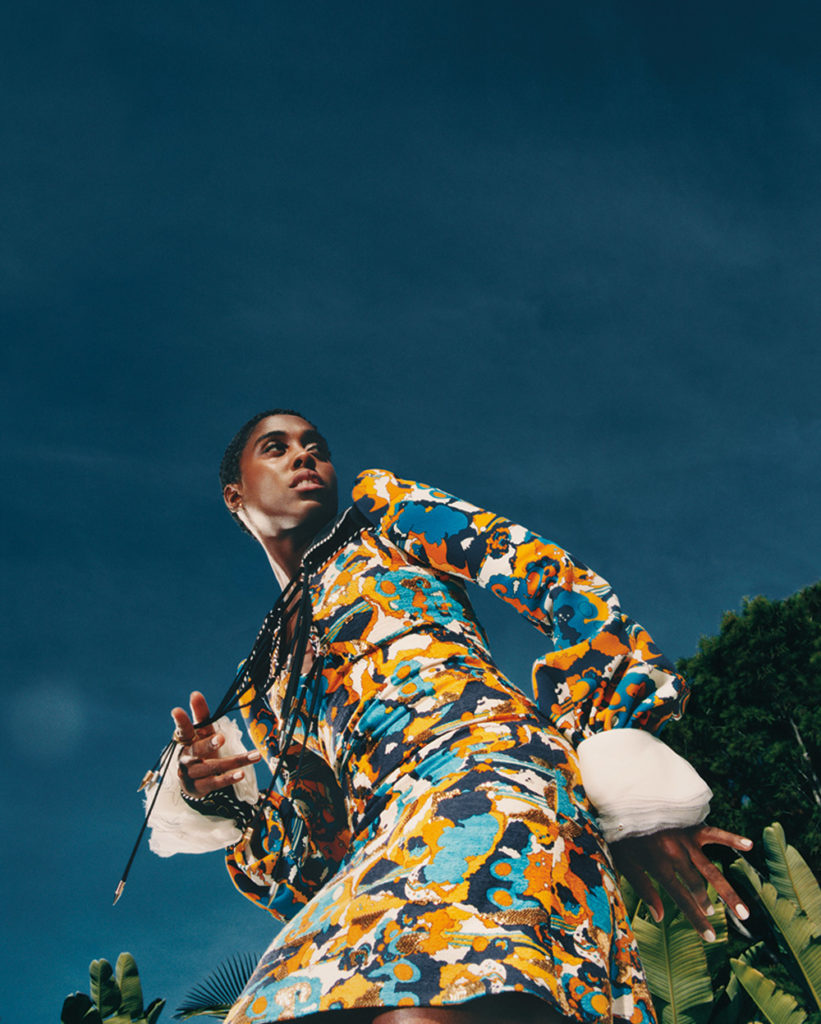
Ultimately, any criticism of Lynch’s addition to the cast of No Time to Die was outshone by the outpouring of positivity that ensued. Her social channels quickly flooded with comments reflecting on the progressive implications of a black female 00 agent, and a sense of anything-is-possible optimism, which propelled her forward. “I want audiences to leave with a new sense of agency in that you’re able to be ladylike, elegant, smart, forthright, highly competent, and skilled all at the same time, and you don’t need to compromise anyone for the other.”
Nomi is just one of many intricate, perspective-shifting roles in Lynch’s acting repertoire. A pupil of classical theatre training at the prestigious Arts Educational Schools London, she began her career with a moving performance of the characteristically male Tybalt in a British stage production of Romeo and Juliet, eventually going onto play Rosaline Capulet in Shonda Rhimes’s American period drama Still Star-Crossed in 2017. Her penchant for the action genre was ignited by her involvement in the 2012 British sports drama Fast Girls—Lynch’s first film—which required rigorous training to portray an athlete on a national track team at the world championships.
Lynch’s dream of joining the cast of a large-scale action film was fully realized in 2019 when she starred opposite Brie Larson in Captain Marvel—the first female-fronted superhero movie in the Marvel universe—as Maria “Photon” Rambeau. As a pilot, single mother, and best friend to Carol Danvers (the extraterrestrial superhero played by Larson), Lynch brought a grounding “earthling dynamic” to Maria— who, to her initial surprise, lacked superhuman abilities. “What Maria taught me was not every superhero wears a cape. I learned that her superhero power was being herself and having agency, being there for her friends, and being an incredible mother.”
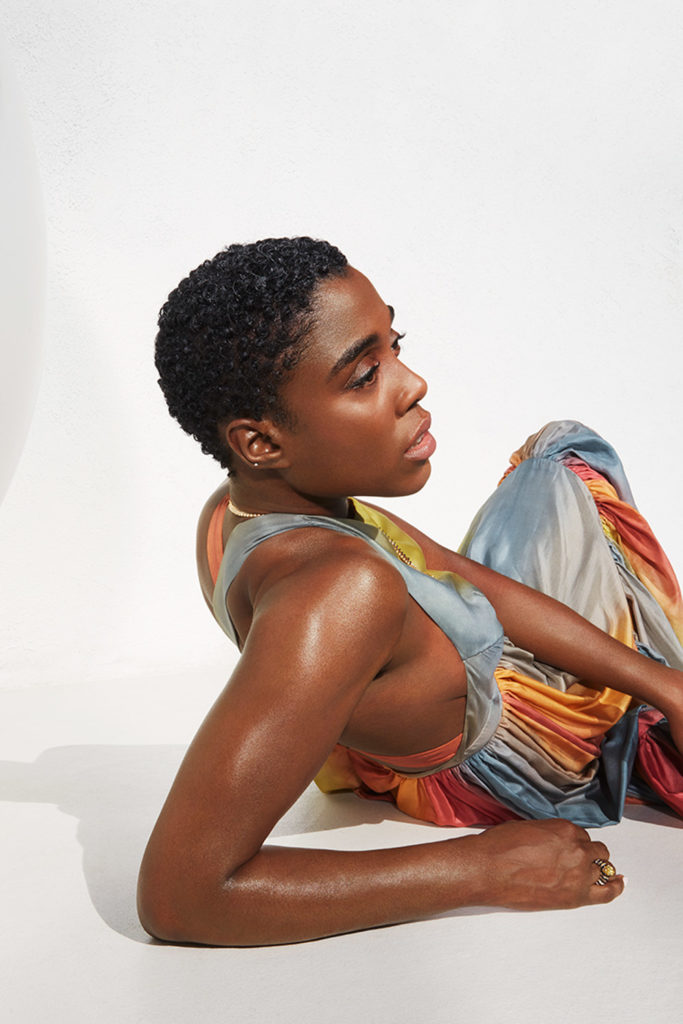
Captain Marvel rocked the box office, earning the rank of 2019’s fifth-highest-grossing film and boasting the sixth-highest-grossing weekend of all time. But far more exciting than the global visibility given to her acting capabilities was the positive response her performance sparked within single mothers and their daughters, who shared their future ambitions of becoming astronauts and pilots. “It uplifted the black community in a way that made me really proud. Single mothers are so under-represented and do such incredible superhero jobs, and no one even pays attention to the hard work it takes to raise a good child on their own.” The feedback was even more rewarding as a daughter of a single mother herself—the woman to which Lynch’s empowering portrayal of Maria was dedicated.
A glimpse into her emboldening upbringing illustrates how the British star came to exude such self-assurance and strength in her point of view. Raised by a mother, grandmother, and siblings who all value headstrong honesty, Lynch was taught to always question whether she felt fulfilled in her endeavours and, if not, to seek out a path to internal satisfaction. “It’s engrained in me to push towards what I believe in and what makes sense in my world. I’m a human being first, a woman second, and an actor last.” The deep-seated racism and sexism Lynch encountered within society made her journey to fulfilment difficult at times, but being brought up in an environment in which she was told she could do anything despite what she was told elsewhere allowed her to persevere. “I had to make sense of why, as a young black girl, I was seen as ‘other’ a lot of the time. At a young age, I had to make a choice between having to let that affect my way of being daily or use it and do something about it.”
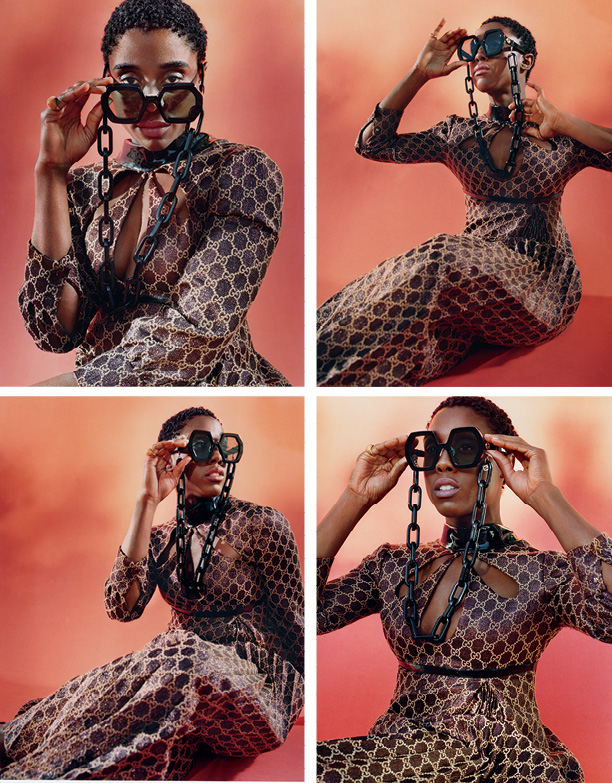
Lynch is set to bring her commanding presence to the upcoming FX show Y—an adaptation of Brian K. Vaughan and Pia Guerra’s graphic novel series Y: The Last Man, which tells the tale of a post-apocalyptic Earth run by women, as all men (save for one) have been wiped out by a pandemic. The show’s pilot was directed by Queen and Slim’s Melina Matsoukas (and one of Lynch’s biggest inspirations)—an apt choice to depict the dark, tense, and unironic representation of what a female-fronted world would look like. Starring as Agent 355, Lynch continues her quest to provide meaningful representation for herself, her community, and the future of mainstream media. “I know that I can, for generations to come, be a good example of someone who was there amongst the change, that represented black women, young people, the working class, and the Caribbean Islands living under one roof. It’s all happening now, and I’m grateful to be a part of it.”
Photography by Leeor Wild at The Canvas Agency
Styling by Erica Cloud at The Only Agency
Makeup by Alex Babsky at The Visionaries
Hair by Lacy Redway at The Wall Group
Manicure by Denise Bourne at The Wall Group
Photo Assistant: Delilah Jesinkey & Elizabeth Aziz
Art Direction by Joanna Kam

